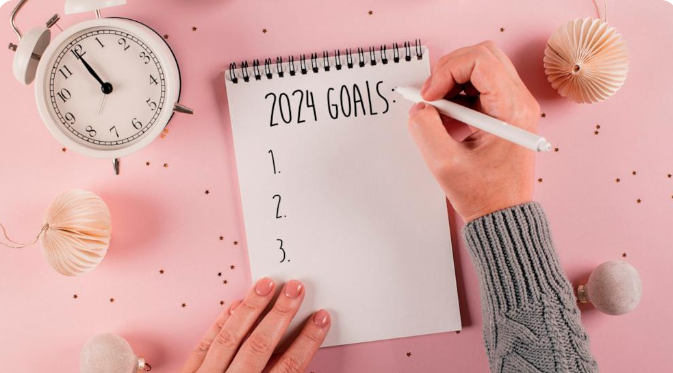As the calendars turn 2024, the question you should be asking is how much you’ve accomplished this past year. But even more important are the goals you set to make this year a healthy and fulfilling one.
In keeping with that spirit, this MedDigest article drives home top health goals you need to prioritize to keep a strong grip on your wellbeing this year. On average, a new year resolution lasts just 3.74 months with just 13% of people sticking with their goals that long, according to a poll conducted by The Forbes Health.
The problem is a lot of people unnecessarily complicate and overwhelm themselves with a barrage of lofty goals. The secret, unbeknownst to many, is to keep it simple and realistic. In order to make the most of your new year, these are essential health goals you need to keep in mind.
⏱️Eat A Healthy Diet
A healthy diet is an important source of essential nutrients and helps protect your health and manage your weight. Eating healthy helps prevent noncommunicable diseases including diabetes, heart disease, stroke, obesity, and cancer. The United States Department of Agriculture’s (USDA) guidelines define a healthy eating plan as:
- Emphasis on fruits, vegetables, whole grains, and fat-free or low-fat milk and milk products.
- Includes a variety of protein foods such as seafood, lean meats and poultry, eggs, legumes (beans and peas), soy products, nuts, and seeds.
- Is low in added sugars, sodium (salt), saturated fats, trans fats, and cholesterol.
- Stays within your daily calorie needs.
Maximizing a healthy diet and weight control promotes longevity by lowering your risk for serious health problems.
⏱️Exercise Regularly
Regular physical activity is one of the most important things you can do for your health. Even with risk factors for heart disease such as high blood pressure, diabetes or high cholesterol, people who enjoy regular physical activity have lower death rates than people who have no risk factors but who aren’t physically active, per data from the American Heart Association (AHA). Want to know the specifics? Regular physical activity helps:
- Lower blood pressure.
- Decrease LDL “bad” cholesterol in your blood.
- Improve blood sugar.
- Reduce feelings of stress.
- Control body weight.
- Improve quality of sleep and reduce the time it takes to fall asleep.
- Improve memory and reduce the risk of dementia and depression.
- Make you feel good about yourself.
Regular aerobic exercise conditions the heart to pump blood to the whole body. Work up to at least 150 minutes (2 hours and 30 minutes) of moderate-intensity aerobic activity or 75 minutes (1 hour and 15 minutes) of vigorous-intensity activity (or an equivalent combination) each week. These are recommended guidelines adopted by the AHA, World Health Organization (WHO), and other reputable medical institutions.
⏱️Don’t Use Tobacco or Vape
The benefits of quitting tobacco begin as quickly as 20 minutes after the last cigarette. Any tobacco use and exposure to tobacco smoke is harmful. Quitting tobacco reduces your risk of heart disease, cancer, chronic obstructive pulmonary disease (COPD) and other diseases.
Quitting vaping can also be part of the step towards a healthier you. E-cigarettes are harmful to your health and have long-term consequences, especially for young people, because users are exposed to nicotine and other harmful chemicals. Commit to quit today, as part of your New Year’s resolutions.
⏱️Cut Back on Alcohol
Did you know that alcohol consumption is a contributor to more than 200 diseases, injuries, and other health conditions? Alcohol consumption increases your risk of injury, as well as longer-term effects like liver damage, cancer, heart disease, and mental illness. Any level of alcohol consumption carries risk.
The 2020–2025 Dietary Guidelines for Americans, also adopted by the CDC, states that adults of legal drinking age can choose not to drink or to drink in moderation by limiting intake to 2 drinks or less in a day for men, and 1 drink or less in a day for women when alcohol is consumed. Drinking less is better for health than drinking more. There are some adults who should not drink alcohol, such as women who are pregnant due to the risk of complications like fetal alcohol syndrome.
⏱️Prioritize Your Mental Health
Mental health includes emotional, psychological, and social well-being. It affects how we think, feel, act, make choices, and relate to others. Mental health is more than the absence of a mental illness—it’s essential to your overall health and quality of life. Loneliness is a serious health risk.
A large body of research shows that social isolation and loneliness have a serious impact on physical and mental health, quality of life and longevity. To improve your mental health and combat loneliness, these are essential tips you need to incorporate in your life:
- Try a relaxing activity. Explore relaxation or wellness programs, which may incorporate meditation, muscle relaxation, or breathing exercises. Schedule regular times for these and other healthy activities you enjoy such as journaling.
- Set goals and priorities. Decide what must get done now and what can wait. Learn to say “no” to new tasks if you start to feel like you’re taking on too much. Try to be mindful of what you have accomplished at the end of the day, not what you have been unable to do.
- Practice gratitude. Remind yourself daily of things you are grateful for. Be specific. Write them down at night, or replay them in your mind.
- Focus on positivity. Identify and challenge your negative and unhelpful thoughts.
- Stay connected. Reach out and connect with friends or family members as a way of emotional support.
⏱️Stay Hydrated
Getting enough water every day is important for your health. Drinking water can prevent dehydration, a condition that can cause unclear thinking, result in mood change, cause your body to overheat, and lead to constipation and kidney stones. Water has no calories, so it can also help with managing body weight and reducing calorie intake when substituted for drinks with calories, such as sweet tea or regular soda.
⏱️Get Enough Sleep
Enough sleep is good for your mental health among other health benefits. Stick to a schedule, and make sure you’re getting enough sleep. Blue light from devices and screens can make it harder to fall asleep, so reduce blue light exposure from your phone or computer before bedtime. The three pillars of health are nutrition, physical exercise, and sleep. All three of these are connected.
Studies show that adults should get seven hours or more a night for good health, per data from CDC. Adults who sleep less than 7 hours each night are more likely to say they have had health problems, including weight gain and obesity, diabetes, hypertension, heart disease and stroke, depression, and increased risk of death.
⏱️Get Good Sunlight
The best-known benefit of sunlight is its ability to boost the body’s vitamin D supply; most cases of vitamin D deficiency are due to lack of outdoor sun exposure. According to National Institute for Health (NIH) at least 1,000 different genes governing virtually every tissue in the body are now thought to be regulated by 1,25-dihydroxyvitamin D3, the active form of the vitamin. This includes several involved in calcium metabolism, and neuromuscular and immune system functioning.
Whereas skin cancer is associated with too much ultraviolet radiation (UVR) from sunlight exposure, other cancers could result from too little. Just make sure you get enough of daily sunlight without doing it excessively. Reducing stress and improving your mood are other health benefits of sunlight that should incentivize you to get enough of it.
⏱️Practice Good Oral Hygiene
Your oral health is more important than you might realize. Like other areas of the body, your mouth teems with bacteria — mostly harmless. But your mouth is the entry point to your digestive and respiratory tracts, and some of these bacteria can cause disease.
Your oral health might contribute to various diseases and conditions, including periodontitis, heart disease (endocarditis), pneumonia, and pregnancy and birth complications like premature birth and low birth weight.
To protect your oral health, practice good oral hygiene daily:
- Brush your teeth at least twice a day for two minutes each time. Use a soft-bristled brush and fluoride toothpaste.
- Floss daily.
- Use mouthwash to remove food particles left after brushing and flossing.
- Eat a healthy diet and limit sugary food and drinks.
- Replace your toothbrush every three to four months, or sooner if bristles are splayed or worn.
- Schedule regular dental checkups and cleanings.
- Avoid tobacco use.
⏱️Schedule Regular Checkups
See your health provider for regular, yearly check-ups. These visits can help you monitor your blood pressure to control and prevent hypertension − the number one silent killer in the world. Many people don’t know they have hypertension and without proper treatment, uncontrolled hypertension can lead to severe health complications later in life.
Regular check-ups with your health provider will also help you keep track of your health status if you’re at risk for hepatitis, HIV, tuberculosis or STIs. Essential tests, such as those measuring your cardiovascular health or sugar levels, can help with diagnosis and management of noncommunicable diseases like heart disease or diabetes early on.
For women and men, health screenings like pap smears or prostate exams, respectively, can help detect cancer. Check with your health provider to find out which tests or screenings you need.
Bottom Line
Let’s start this New Year with a strong resolve to keep our physical health and mental wellbeing a priority. Every other goal is built on the back of good health; hence the saying, “health is wealth.” The entire MedDigest Team wishes you a blessed year full of success, joy, and grace!

